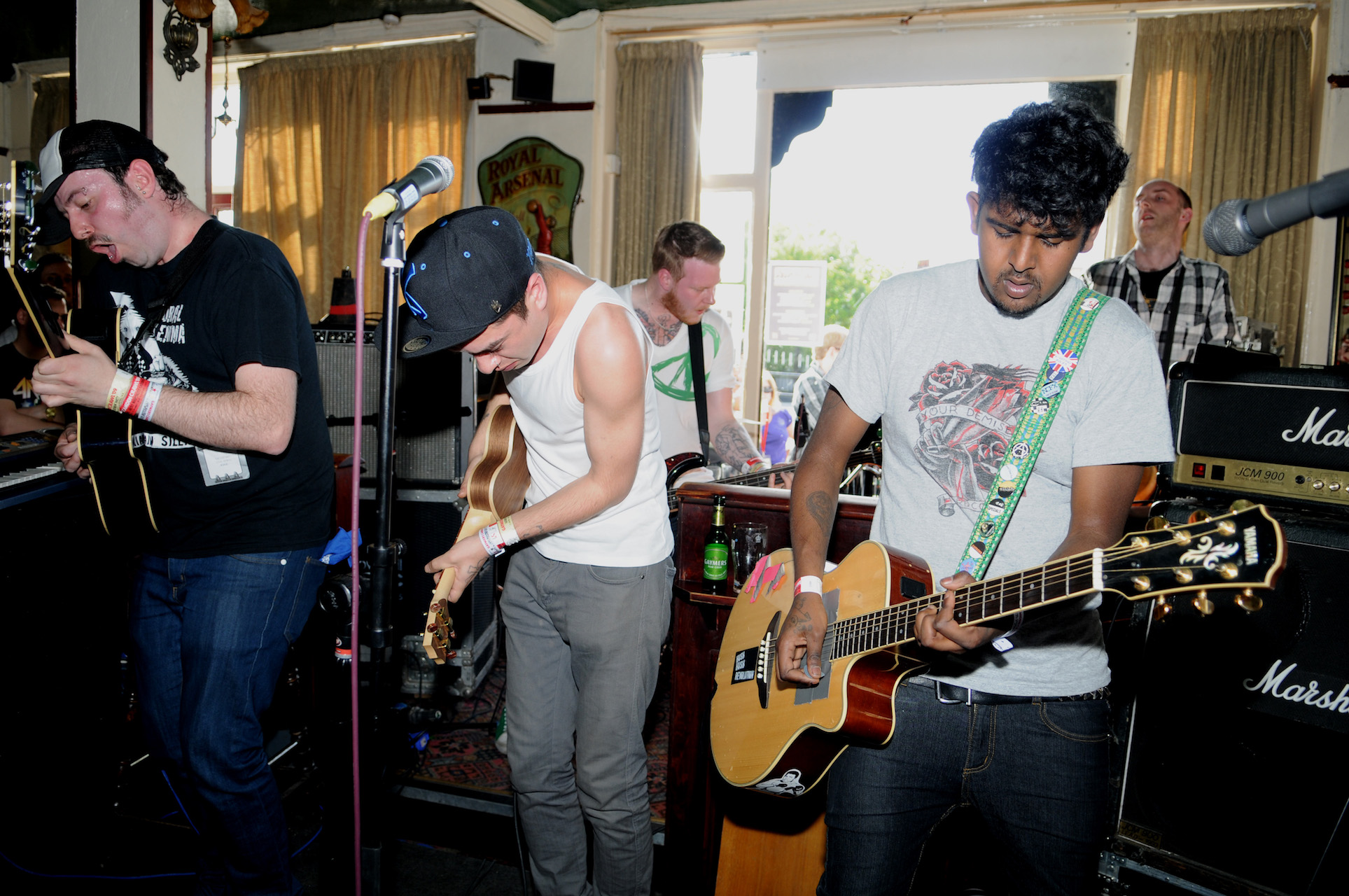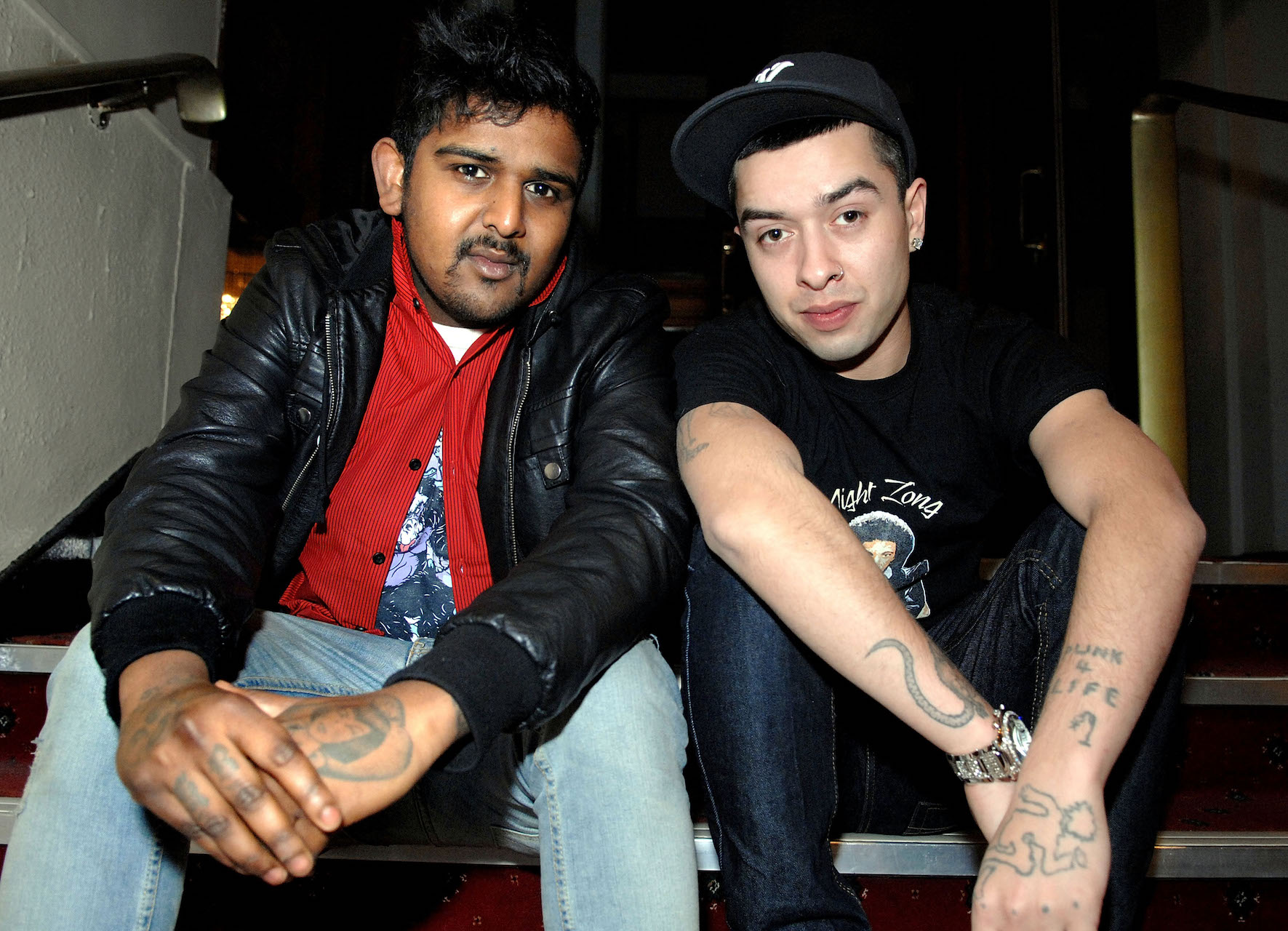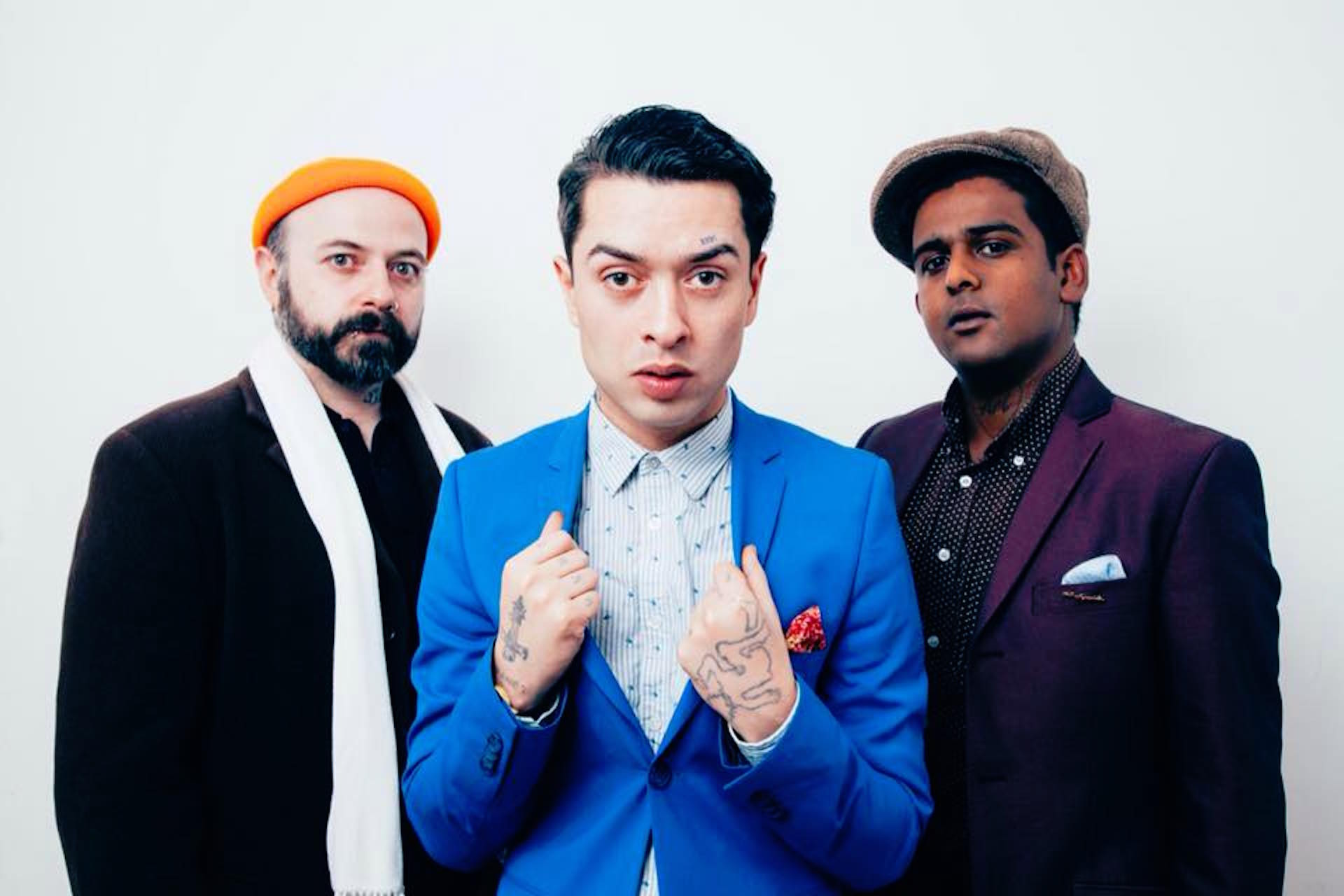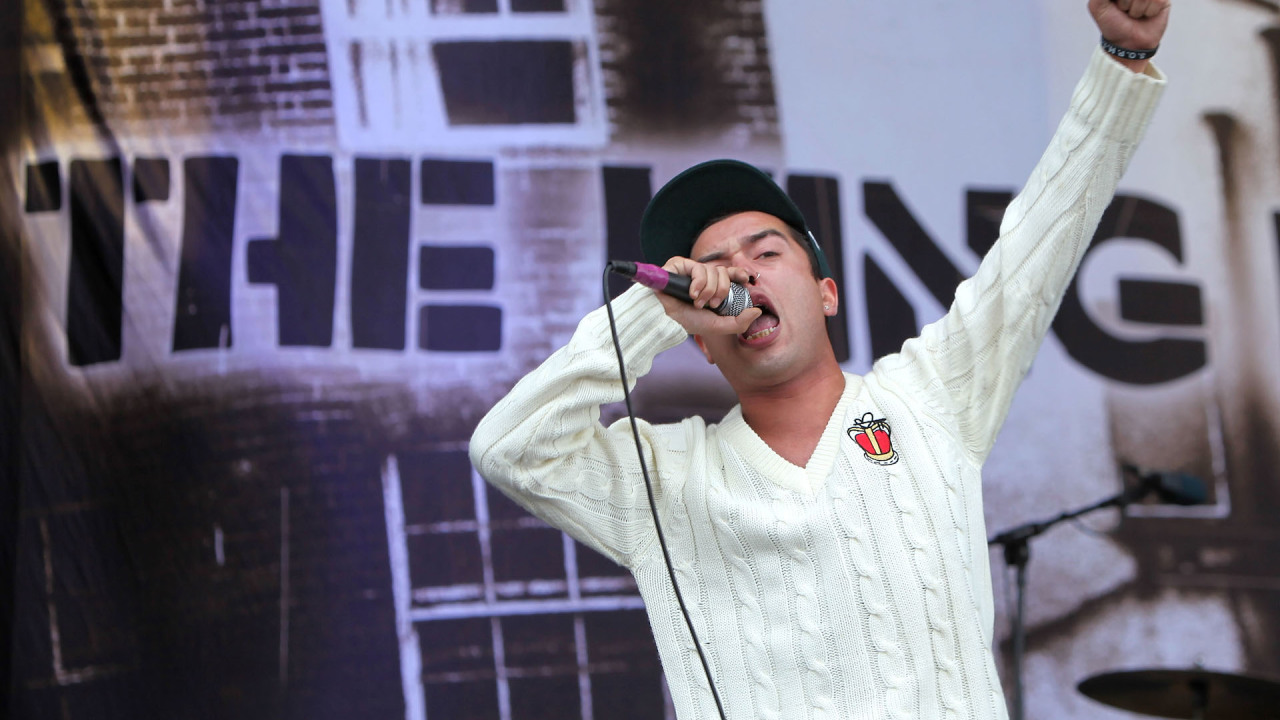“I’m here to put a boot up the arse of the establishment. I’m here to take down David Cameron and his disgusting fucking government.”
That distinct voice of dissent belongs to Itch: the self-proclaimed activist who rose to fame as the outspoken leader of celebrated political punk rockers The King Blues. And it’s just the start in a long list of the reasons as to why the band has chosen this moment to reform.
“It’s time for a reality check,” the singer explains. “ I’m here to take bland music out the picture. I’m here to bring culture back. It’s time for rock ‘n’ roll to start meaning something again. The King Blues are back to make rock ‘n’ roll mean something again. It’s going to be dangerous. And it’s going to be street level. So watch out!”
It’s about time.
When The King Blues disbanded amidst a sea of controversy back in 2012 we lost a vital voice in music, and there’s been a gaping void in UK punk rock ever since. From the time of their fourth and then-final album – the posthumously released Long Live the Struggle – we’ve been waiting for a new group of young political agitators to come along and pick up where Itch and company left off. We waited. And we waited… but no one came.
Until now that is. Only it isn’t a group of new young hopefuls that have raised their angry little heads. It’s the original King Blues line-up. They’re back, “a little older, a little wiser, and a lot more pissed off.”
We sat down with frontman and founding member Itch to talk about the past, present and future of the band…

The King Blues formed in Camden in 2004 – just you and an acoustic guitar. Did you ever imagine it would evolve into such a successful band?
Itch: “We were just punk rock kids, and to us the biggest band in the world was Capdown. They were our Iron Maiden. You couldn’t be bigger than that: selling out The Underworld was as big as it got. So when we signed to Household Name [a DIY punk rock record label based in London] that was when we thought, ‘This is it! This is as big as it gets. We’ve done it guys.’ And I think from there we always kind of surprised ourselves with how far it went, and how many people liked us.”
The debut album Under the Fog came out in 2006. What are your memories of making that record?
“As a band we were still finding our feet with the first record. I totally didn’t know what I was doing. Jamie bought me a ukulele for Christmas one year as a joke, and I used it to write Mr. Music Man. That’s why that song only has two chords: because I didn’t know any more. Then I learnt a third, and the rest of that album was just those three chords.”
After that things started happening pretty quickly. In 2007 you signed to Island Records, who released your second album in 2008, and from there the press interest grew quite rapidly. Did moving to a more mainstream label effect the songwriting in any way?
“By the time we got to Save the World [Get the Girl], we’d been on tour for a couple of years and we’d learnt how to play a little better. So it was a really natural progression. It was never a case of, ‘Alright, now we’re on Island we need to start writing songs to get on the radio.’ And it’s really not as easy as that. Once you start thinking cynically like that, your songs don’t connect with people, and that’s kind of the weird Catch-22: the less you care about money, the more it comes in.”
Musically speaking, Save the World… was a notable step up from Under the Fog. What influenced that progression in sound?
“I started listening to The Pogues a lot more. Shane McGowan became a big influence on me. Whereas before I think it was very much just straight up punk rock and reggae, the second album was a lot more influenced by people like Elvis Costello, Shane McGowan, Squeeze, and even Morrisey. That’s why we ended up working with Clive Langer: because he’d produced all those records that we loved by classic British bands like Madness. I was listening to loads of that stuff and analysing the songs. I’ve always been a student of songs and of how they’re put together, and by that point we’d figured out as a band how to come together and make it work.”
Save the World was met with critical acclaim and reasonable commercial success. Everything seemed to be going great for the band, and then half the members quit. What happened?
“I didn’t make a clear enough distinction in the band, and people were confused about whether they were in the band or not. There was never any contracts or anything like that, because we never wanted to do that. But the fact of the matter was that the band was just the three of us [Itch, and guitarists Jamie Jazz and Fruitbag], and then live we had other people backing us up. So the lines became blurred, and they thought because they were playing shows that they were in the band. I guess they got pissed off because they wanted more.”
How does that explain Fruitbag quitting? He was in the band, and when he left he posted a derogatory article online about how the band had become more like a dictatorship than a group of mates making music together, which was what he believed The King Blues started out to be.
“I guess Fruitbag just got swept up in that. I can’t speak for him, but I think he just got swept up in the fact that some people weren’t happy and there was a bit of a divide in the camp. And at the time he was with a girl that he was pretty much ready to settle down with, and he didn’t really want to do the band anymore. The other guys didn’t really want to be in a band either. They weren’t happy traveling all the time: it wasn’t in their blood or their lifestyle, and it wasn’t made out for them. They were homely people who wanted to spend time with their families, whereas me and Jamie were rock ‘n’ rollers, and the road was the place where we felt at home.”

With Fruitbag back in the fold following last week’s announcement that the original line-up was reuniting, assumedly you’ve now made your peace?
“I think with time, now we can sit back and laugh at it a little bit. It shocked me when that article surfaced though. I didn’t expect that at all. So it was a weird one, really, but the first of many!”
His departure coincided with Island Records dropping you in 2010, which was when you went into the studio to start recording Punk & Poetry. That must’ve been a difficult time for a band.
“That album was such a struggle to make. It was a real struggle to make. We’d just come off tour with Enter Shikari, the band had left me and Jamie on our own, and we were thinking about what the hell we were going to do. Jamie’s at-the-time girlfriend was pregnant too, so he took paternity leave during the Punk & Poetry recording session, which left just me and our producer together in the studio. That’s why a lot of tracks on that album are very heavily programmed, and there’s a lot of poetry and skits on there. We were basically trying to figure out how to put a record together without a band. Jamie came down for like the last three or four days, but the rest of the time it was just me, some other musicians who I got in - who eventually became the band, but at the time were just kind of hired guns - and my producer, just throwing an album together.”
That doesn’t sound ideal, but you must’ve enjoyed the challenge.
“Right, and at the same time I had so much written, and there was so much that I wanted to say. I also had this vision of what I wanted the album to be like, so it was kind of a blessing in a way. I think I needed to be a bit of a mad scientist in the studio, and that album really feels like mine because of that. I feel like I was really there for the whole of it, and I birthed it and nurtured it as it developed.”
The way that album was made also lends itself to the music you were writing at that time, which is when the hip-hop influences started creeping in.
“For sure. It was a really fun, creative album to make, and at the time I was really getting into a lot of hip-hop. I’d had enough of doing raga flows and I just wanted to be rapping over stuff. I’d also had enough of reggae. By that point I just wanted to be doing punk rock and hip-hop, and that album gave me the chance to do that. I learnt a lot from doing it like that as well.”
Is it possible to go back to being in a proper band after an experience like that though? Surely the gang mentality was gone.
“I guess I didn’t know that at the time, but yeah. Once the team that you’ve got behind you gunning for you goes, you’re out there on your own. I’ve always been a bit of a survivor and a fighter, and I figure out a way no matter what. But it definitely took the wind out of my sails a little bit, and after that I wanted full creative control.”
**Is that when the rift with you and Jamie began?
** “I don’t think that necessarily caused any rifts because Jamie’s always trusted my vision, if nothing else. He’s always given me a lot of artistic trust, which is really cool. But I guess that experience was a bit of a turning point, in terms of finding different ways of going about making music.”
Stepping outside of the band politics for a minute, this was also around the time you started waging a personal war with fascist parties like the BNP and EDL, and right-wing publications such as the Daily Mail. Would it be accurate to say that the politics was always just as important as the music with The King Blues?
“There’s some bands out there who make great rock ‘n’ roll music, and that’s it. And there’s some bands out there that have fantastic politics, and that’s it. We were always about mixing the two, by writing good songs and taking on people like the Daily Mail, who I believe are dangerous. I believe that things need to be questioned. Even if to converted minds it seems very obvious and it’s a groove already set in your record, to a lot of other people it’s not that obvious, and unless the bands that people care about are talking about these things then nothing is going to change.”
What did you do to piss off the Daily Mail so much?
“We sent a record off to the Daily Mail knowing full well that they’d hate it. We just wanted to get a quote back from them. We never thought in a million years they’d send it back saying they were pulling everything that they’d ever written about us off their website. That started a little ongoing war with them, and that was fine by me. If you’re going out there and claiming that you’re a punk rock band, or a rock ‘n’ roll band with edge, or a band of the people, then you need to have enemies. If you haven’t got enemies then you’re not that at all. You can’t have everyone on your side, because there are always two sides to everything. To get behind someone, they’ve got to be fighting against somebody or something else. That’s just the way it is. I haven’t always picked my enemies wisely, and I haven’t always picked popular causes to get behind, but I’ve always picked ones that I thought were right.”

Going back to the band, after the release of Punk & Poetry it seemed like you had the whole world at your feet. You went out to LA to record your fourth album with John Feldmann, and it promised to be your best record yet. But then from out of nowhere, you announced that the band was breaking up before that album was even released. Again, what happened?
“It all completely fucked up. I’m not going to go into the ins and outs of exactly what happened, and it’s not like it was just one thing that happened. We’d all gotten to a point where we’d lost respect for each other, and once respect goes that’s it. Everyone was being ostracized, and it really wasn’t a fun place to be. We all just wanted out by that point.”
Looking back at that period now, what would you have done differently if you had the chance?
“I realise now that we should’ve just taken time out. I should’ve just gone and worked on my solo record with Feldmann, and left King Blues alone for a year. But no one wanted to do that, and I personally wanted to juggle every ball in the world and have it all. I tried to take on too much, and all that stress wasn’t conducive to creativity. By that point we were on to the second album that was being put together under weird circumstances, and frankly the fight had gone.”
How did you leave things with Jamie when The King Blues broke up in 2012?
“The last show we did together was at a tiny little punk rock club in Orange County called Chain Reaction, and by that point we knew it was the last show we would be doing together for a while. The album was done, and that was the last we would see of each other for a bit. So we stopped putting up a front of caring and pretending to be nice to each other, and it was obvious at that point that we’d lost all respect for one another. And when there’s a mutual loss of respect like that, it takes something pretty special to bring that back.”
How do you feel about it all now, looking back at the way things ended?
“I think everyone always walks away from a band feeling stabbed in the back, and I think I felt pretty done over. I felt like I’d given it my all, and what had I got for it? I focused on the negative sides, rather than all the positive sides, and at that time I was pretty convinced it was done. I felt I was a different person, too. It wouldn’t have been honest of me to carry on when I wanted to focus on different things. My song writing had developed and I didn’t want to keep doing ska-punk records. I wanted to musically and creatively do different things. It was nothing to do with success. It was more down to how I felt about my own art, and I wanted to do stuff that was different. So it felt right at the time. And to be honest with you, I think I needed to do a bit of self-destructing in order to split up the band, because there was no way they would’ve allowed me to continue to do my own thing had I not. So I needed to do that, and it was kind of vital that I did. I know now why I did it: I had to do it to split up the band and move on.”
What made you want to get The King Blues back together?
“When we first formed, we were fighting against a Labour government that was going to war with Iraq. Now we’re in the final term of a Tory government who are looking to leave their legacy, and if you look back at the old years of Thatcher - sorry to sound like an old punk going on about Thatcher – and how she shut down the trade union movement, to now and how it’s a pitiful excuse of what it once was. Well, I think David Cameron has the power to shut down the protest movement in the same way, until it’s the kind of a thing that our parents did. And that would not only be really sad, but also really dangerous. We can’t let things go unquestioned. There’s also a war on culture happening right now, with music venues being shut down left, right and centre. We’re coming to a point in society where if something doesn’t have immediate monetary value then it has no worth at all. Things like art and culture, which actually make our society a better place worth living, create discussions where we realise how similar we are, or how different we are, and how we’re equipped to deal with these issues. They might not have any immediate monetary value, but they’re innately valuable to a society, and that’s what a government should be looking out for. They should be looking out for the best of society as well as the best of business, but they’re not. So I think there’s a real battle on our hands right now.”
Do you feel like there weren’t any bands that picked up where The King Blues left off then?
“If there’d have been a bludgeoning protest movement since the demise of The King Blues, we probably wouldn’t be getting back together to be honest. We’d say, ‘Fantastic! Go and support those bands: they’re brilliant.’ But there’s not. And I don’t think that’s because people don’t believe in it. I think it’s because the industry is the way that it is, and bands are too scared to say anything. And the industry is certainly too scared to put out any bands that are saying anything. But we’re fortunate enough that we fought our way through that shit, and we have an audience that we can take it back to again.”
So how did you go about getting the original line-up back together?
“I decided I wanted to make another King Blues record earlier this year. I’ve been doing a lot of writing for it, but I hadn’t told anyone until recently. I sent a couple of texts to Jamie and Fruitbag and invited them over. I just said, ‘Beer?’ and within an hour they were there. I played them some demos and we had some beers, and it was like old times. We got together last night for a drink as well, and it’s always going to be weird because there are so many stories to go over and so many things – good and bad – to catch up on. But it’s cool, and I’m really excited to do it with them again. It’s gonna be jokes.”
What can we expect from The King Blues in 2016?
“Listen, I’m on no greatest hits tour. I’m on no chicken in a basket, working man’s club, retro vibe. I’ve got no interest in doing that. I’ve only got interest in being vital and taking on people. I miss the fight, man. I’m here to take down this government. That’s what I want to do. We’re a little older and a little wiser now, and we’ve reflected a little more. What I’m really interested in at the moment is how disposable everything has become, from the clothes that we wear to the partners that we keep, and I’m just as guilty of that as the next person. But everything has become so disposable, and gentrification – especially in London – has become a huge issue for me. But mainly we’re here to take down the Tory government, and hopefully flip people’s way of thinking into a much more harmonious way.”
Can you remember the last time a band challenged you like that, in the same way as say the Sex Pistols, Public Enemy, or Rage Against Me The Machine?
“I can’t remember the last time I heard anyone like that. I mean, I fall in love with great songs all the time, and if you write a great song about a girl then it’ll grab me, and it’s worth everything. But there is room. There is room. Especially considering all that’s going on, and how many people are being fucked over. Particularly musicians. All your venues are being fucked over, and the places that you used to play are gone, and you’re not going to write a song about that? What on earth is going on? Musicians get to travel and actually see the effects of decision makers around the world. And traditionally artists are those who will think differently and try to show different ways of thinking. If you’re not doing that, are you really an artist? It doesn’t have to be political, but unless you’re trying to philosophically show people something a bit different to the norm, then you’re not an artist. A lot of music now is so homogenised, it’s trying to fit into regular society and become background music to it. But to me, art should never be about fitting into to the background. It should always be about being in the foreground and questioning everything. I’d ask how many real artists there are operating in the mainstream now.”
How many do you think there are operating in the alternative music scene?
“There are a few. But what’s really alternative about most of it? Are they really trying to be forward thinking and change the world? I don’t think so. Marilyn Manson was alternative. Slipknot was alternative. Nowadays people come together trying to look different, but they all look the same. They’re just mainstream, but with red or green hair. That’s not alternative at all. The only one I can really think of is Enter Shikari.”

Yes, your old tour mates Enter Shikari. Are you excited to be heading out on the road with them in 2016? Even though you’re very different bands musically, The King Blues has always shared a lot in common with Shikari.
“The bands that we’ve been associated with, been in the movement with, or just been really great friends with, have always been sonically totally different to us. It’s only ever been the ideals that have linked us. But for whatever reason the Enter Shikari fans have always been really supportive of us and everything we’ve done. And I love that band. The way they come up was completely different to the way that we came up, but I really respect it and it was incredible to watch. I love their records, and there’s a reason they’re one of the bands from back in the day who are still carrying on and still doing great: it’s down to the integrity they have and the way that people believe in them.”
What’s also great about Shikari is that they’re a political band, but they’re not preachy in any way. They’ve got important things to say, but they also write fantastic songs that make you want to laugh and dance, and have fun.
“That’s what I really love about them. They’re not there going, ‘This is shit! This is shit!’ They’re bringing about positive change, and putting like-minded kids in touch with each other and empowering them. I love that about them. It’s what makes them so exciting and refreshing, and exactly the kind of band that I want to be involved with. I don’t want to be with the moany old men who are telling me everything’s rubbish. I wanna be out there with the young kids who want to try and change the world. And that’s the kind of fans Enter Shikari have. So I’m super excited to be going on tour with them again.”
For more information on The King Blues, visit their official Facebook page.

